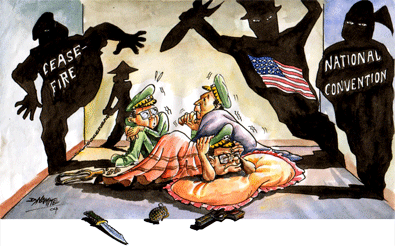
| By AUNG ZAW | AUG, 2004 - VOLUME 12 NO.8 |
Why are Khin Nyunt & Co scared to sleep at home?
Chances are high that the Burmese intelligence chief, Gen Khin Nyunt, is sleeping in his office tonight. He won’t be alone—several high-ranking members of the regime have made the War Office in
When the generals staged their bloody coup in 1988, one of their objectives was to restore law and order.
Today, the military leaders proudly claim to have restored peace and tranquility in the country. But this is only partly true—paradoxically they need to maintain an unofficial but visible “state of emergency”. And if that means sleeping at the War Office—well, so be it.

Khin Nyunt once told the semi-official newspaper Myanmar Times that he has been sleeping in the office for many years. Even if his wife and family complain, he has several regime colleagues for company.
“They still are paranoid and they cannot remove the mentality of being under siege,” commented one Asian journalist who was in
The War Office became the generals’ second home when martial law and a nationwide state of emergency were declared in 1988.
Living conditions at the War Office aren’t exactly spartan. “The place is like a five-star hotel,” according to one source.
The generals’ wives don’t seem to be too unhappy about the arrangement. Many take advantage of their menfolk’s absence by taking shopping trips to
One reason for staying over at the office would appear to be the dangers the generals and their staff evidently fear they face when traveling to and from their homes.
Top generals are always heavily guarded by an escort of vehicles manned by armed troops. Journeys outside
It’s hard to reconcile such a scenario with the generals’ claim to have established stability in regime-ruled
The claim is based on post-1988 actions that certainly appear to have created a largely quiescent country.
Urban dissidents were suppressed, while nearly 20 rebel groups in the countryside struck ceasefire deals with the generals.
Today,
But still the generals are uneasy. Why else are they sleeping at the office and traveling around under the heaviest security?
The answer, according to Burma-watchers: they actually need instability as a raison d’etre.
“They want to show stability has been achieved, but the trouble is they also want a little bit of instability,” commented a journalist in
It’s a fact that military-ruled countries need instability as a pretext for remaining in power, with the support of security forces.
A perceived threat to stability occurred in May last year, when opposition leader Aung San Suu Kyi and her convoy were attacked by thugs backed by the government. The generals saw Suu Kyi and thousands of her supporters as a threat to which they responded by force.
|
|
The ambush was well planned, with the support of local security forces and the Union Solidarity Development Association, the junta’s mass organization.
The assault on Suu Kyi and her supporters was the largest government-organized attack on opposition groups since 1988. The junta claimed that it had had to act vigorously because Suu Kyi and her democracy movement were creating instability in the country.
Subsequently, Muslim riots broke out in
Diplomats and observers at the time suggested that the regime deliberately created religious riots in order to demonstrate that the situation was not stable. Consequently, it would not be appropriate to free Suu Kyi, who is still under house arrest.
Bomb attacks in
The day after the three explosions—which were minor and caused no casualties—the regime’s intelligence service called a press briefing and quickly blamed dissident exiles, although there was little evidence to support the charge. When bombs go off in other parts of the world it takes some time to establish responsibility, but here the culprits were named the very next day!
“These terrorists groups have done these activities to cause public panic, to cause injury, and to disturb the ongoing National Convention and to give the image that
Exile groups were amused by the junta’s accusations—maintaining they could have done a better job.
Rangoon-based observers, anyway, doubt that rebels or exiles could penetrate the tightly controlled capital.
One theory suggests that the regime might have planted the bombs as a ploy to enable it to vilify vocal exile groups and promote the constitution-drafting National Convention, which is boycotted by
Aside from maintaining
Since rebel groups are largely based along the borders, generals found a convenient excuse to expand military bases in ethnic states.
In southern
The chimera of internal security threats fades dramatically, though, in comparison with another evident fear harbored within the War Office: an Iraq-style strike by the
Regime leaders clearly suspected
A new post—air defense general—was created, even though the country lacks an effective air force.
Khin Nyunt’s intelligence faction strongly believed that the
It’s interesting to note that Suu Kyi is constantly being described as a puppet of the West. If she were in power, say the generals,
You have to be really paranoid to believe that. Paranoid enough to bed down at the office.